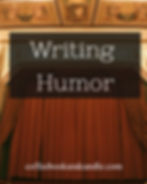Writing Humor: Tips and Examples
- Jordan
- May 17, 2021
- 4 min read
Updated: Nov 16, 2024
One would suppose writing humor to be simple, especially if you consider yourself a humorous person. But everyday jokes are different from written humor—mainly because most of us don't think of those witty quips until later. What sets fictional humor apart and how can you master this storytelling device?
Follow me, gremlins. Writerlings. Amigos.

TYPES OF HUMOR
Like everyday people, your characters will exhibit different types of humor. And, keep in mind, the character may not intend to be funny but can come across that way.
Goofy
This character's humor derives from the absurd: creating odd scenarios or spouting dramatized, off-the-wall comments that can be self-effacing or just plain silly. The overdone nature of "goofy" usually means this character is trying to get a laugh out of someone or make lighthearted, well, light of a situation.
“Behold!" Percy shouted. "The god's chosen beverage. Tremble before the horror of Diet Coke!”
- The Mark of Athena, Rick Riordan
Slapstick
An offshoot of the goofy character, this person might not be put-together and is clumsy as all get-out. This humor is often unintentional on the character's part.
Maybe they trip over their words and their feet. Maybe they spectacularly bumble everything they attempt. The goal is to keep their klutziness a running joke and not make the consequences so dark that readers can't laugh at it.
Cocky
Why do we love characters like Han Solo? Because they're cocky in a way that doesn't take themselves too seriously. It's a funny kind of self-assurance, because you know it's a cover for a squishy or noble heart.
“Captain,” she murmured. “I think I’m in love with you.”
An eyebrow shot up. She counted six beats of his heart before, suddenly, he laughed.
“Don’t tell me it took you two whole days to realize that. I must be losing my touch.”
- Cress, Marissa Meyer
Sarcasm
Ah, one of my favorites. The level of sarcasm can vary from teasing to cutthroat, but the important thing is giving this character someone to play off of. They can both be sarcastic, or maybe the other character is oblivious or unamused. Sarcasm is quick, often deadpan, relying on word play, witty comebacks, and blunt observations. This type of humor, in my opinion, works best when there's less ill intent, because it can cross into unimaginative insults that make your character a bully rather than slyly intelligent. Of course, that's not to say sarcasm can't be used as a brutal shutdown towards a horrible character or from a horrible character.
“Of course." A wicked gleam entered his eyes. "But I only turn girls into salamanders on Tuesdays. Luckily for you, it's a Wednesday, which is the day I drink a goblet of orphan's blood for supper.”
- Sorcery of Thorns, Margaret Rogerson
Straight Man
In comedy, the serious character that the humorous ones play off of is known as the "straight man." They can be bitingly sarcastic, grouchy, or oblivious, but they serve as a contrast to the oddball characters, thus highlighting the humor.
UTILIZING HUMOR
Now that you have different types of humor in your arsenal, you're ready for those tips on implementing comedy into your writing.
Comedic Timing
Timing is exceedingly important in humor. Most often, you want a quick-punch line following the incident, or a rapid-fire burst of dialogue between two or more characters.
Each line must add something to the overall sarcasm or absurdity and make sense altogether (yes, even if they're chatting nonsense).
You also need to be aware of the scene's context and whether it's an appropriate place for humor. If you've made the setup too dark or emotional, the humor will be more jarring than funny (though there is a place for dark humor).
Jesper knocked his head against the hull and cast his eyes heavenward. “Fine. But if Pekka Rollins kills us all, I’m going to get Wylan’s ghost to teach my ghost how to play the flute just so that I can annoy the hell out of your ghost.”
Brekker’s lips quirked. “I’ll just hire Matthias’ ghost to kick your ghost’s ass.”
“My ghost won’t associate with your ghost,” Matthias said primly, and then wondered if the sea air was rotting his brain.
- Six of Crows, Leigh Bardugo
Flipping Perceptions
Written humor often comes from characters seeing a situation from a weird angle. Scenes that might otherwise be intimidating or serious can turn lighthearted from one character's quirky observations.
Hades raised an eyebrow. When he sat forward in his throne, shadowy faces appeared in the folds of his black robes, faces of torment, as if the garment was stitched of trapped souls from the Fields of Punishment, trying to get out. The ADHD part of me wondered, off-task, whether the rest of his clothes were made the same way. What horrible things would you have to do in your life to get woven into Hades' underwear?
- The Lightning Thief, Rick Riordan
Setting Yourself Up
This is the absolute best part of writing humor: setting up your own jokes and scenarios. No one has to know if it took you five minutes or five days.
Anytime you come up with a fun quip you couldn't use, a made-up conversation with a witty partner—save it! It could find a place in your writing.
“I don't do vague. If I want to call you a coward, I will bock at you in no uncertain terms.”
- Time Untime, Sherrilyn Kenyon
Enjoy today's tips? Follow the writing tags below to discover more, or let us know in the comments what your favorite type of humor to read or write is!

